2011版高中英语课时讲练通课件:Unit14《Careers》Period6(北师大版必修5)
文档属性
| 名称 | 2011版高中英语课时讲练通课件:Unit14《Careers》Period6(北师大版必修5) |
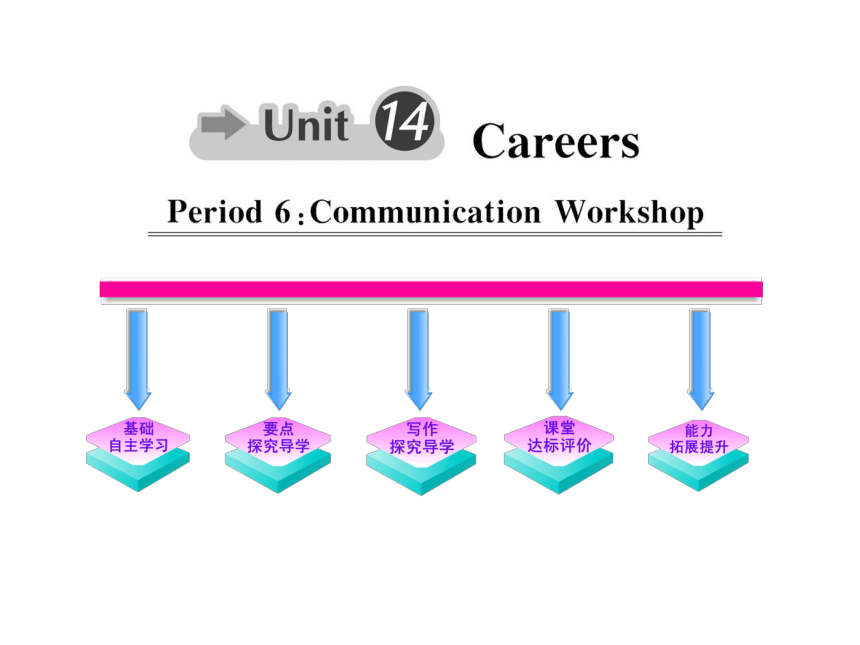
|
|
| 格式 | rar | ||
| 文件大小 | 4.9MB | ||
| 资源类型 | 教案 | ||
| 版本资源 | 北师大版 | ||
| 科目 | 英语 | ||
| 更新时间 | 2011-11-06 00:00:00 | ||
图片预览


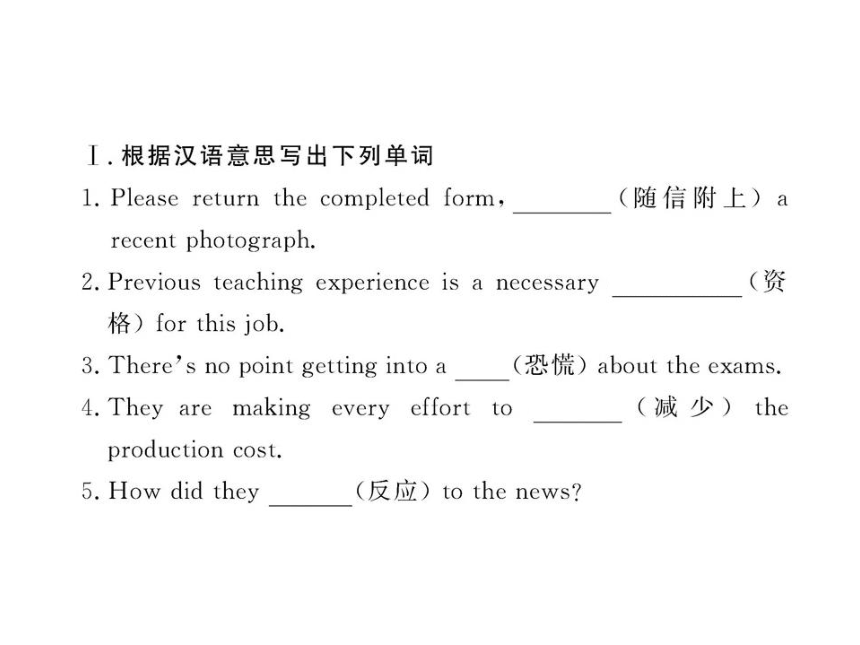
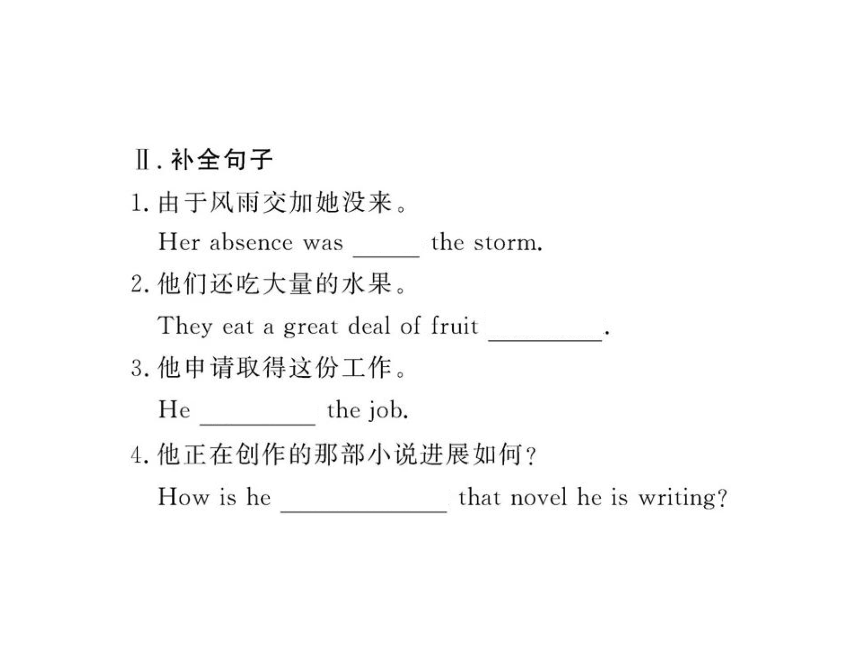
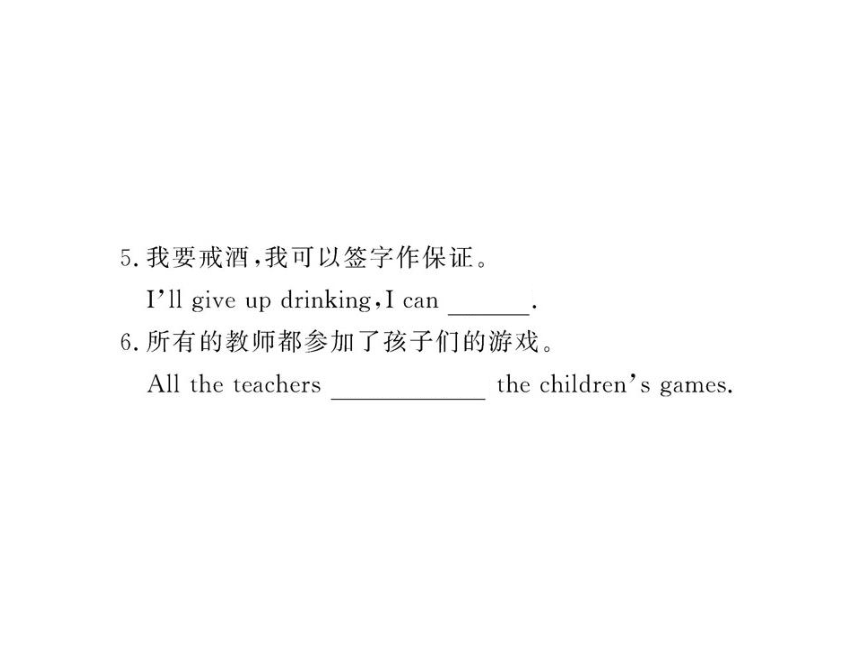

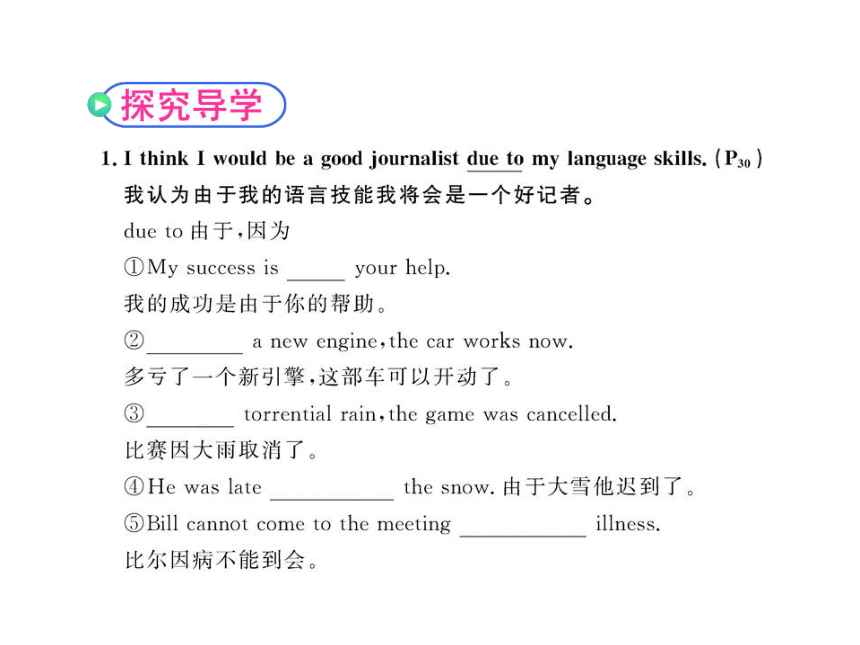
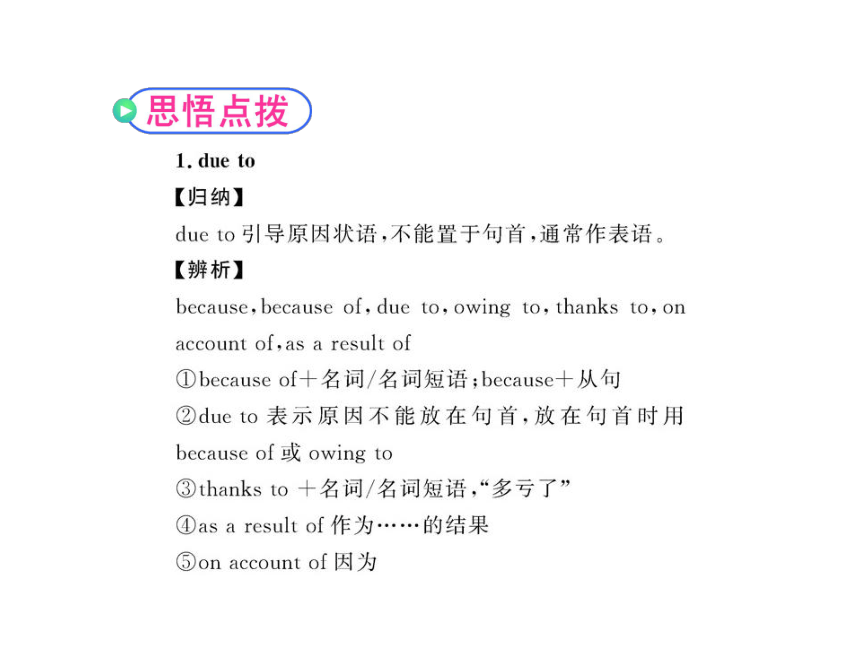
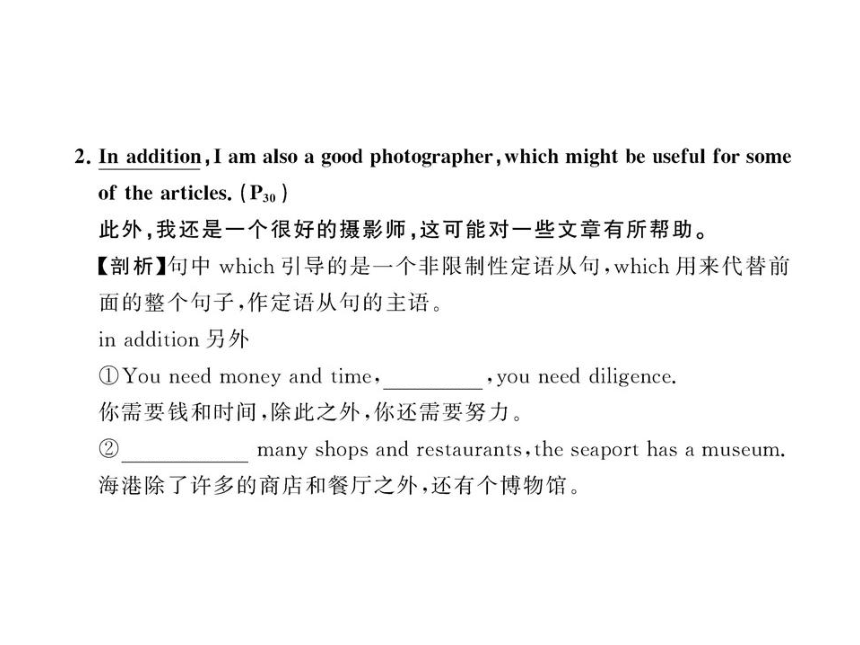
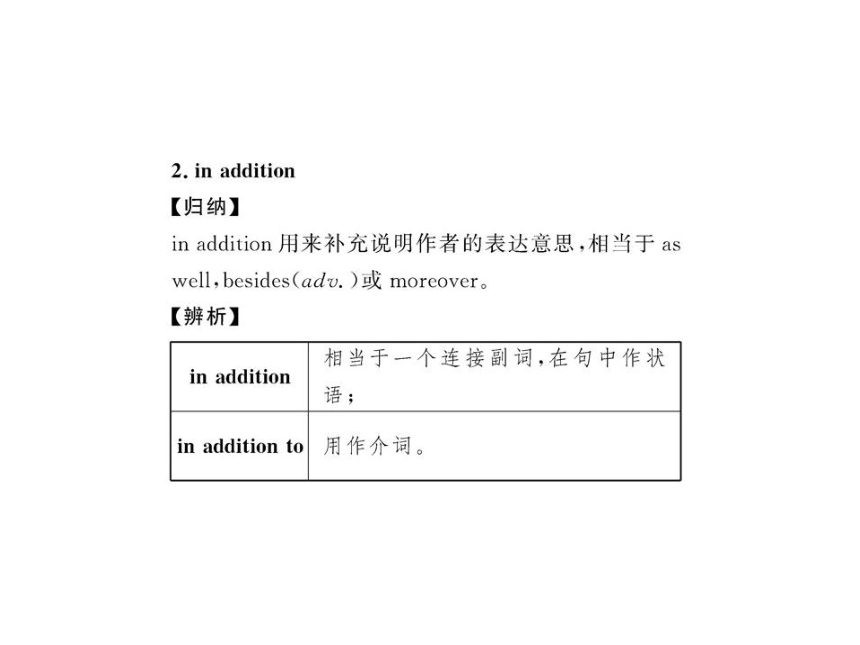

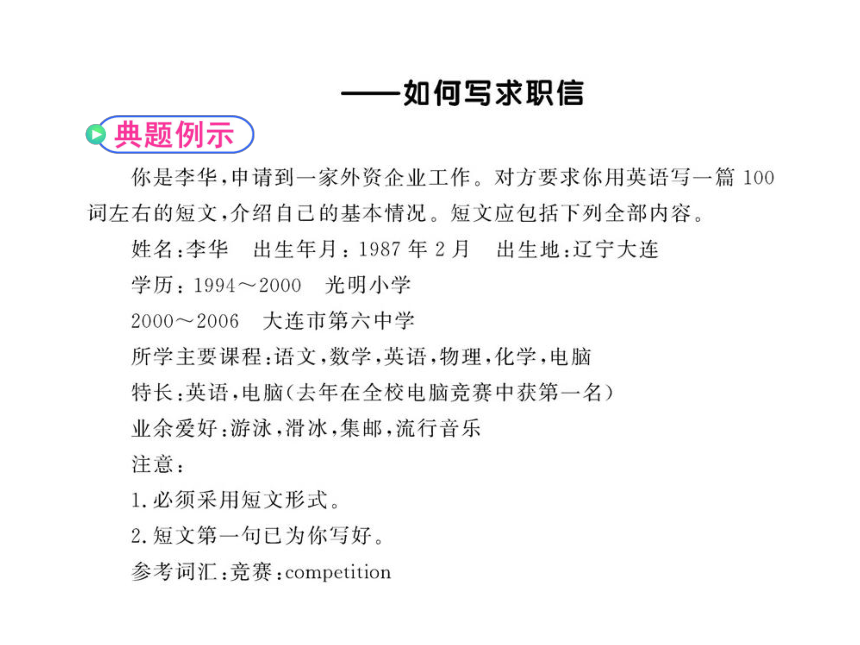
文档简介
(共40张PPT)
Ⅰ. 选用正确的单词填空
enclose, qualification, panic, bother,
flexible, operate, decrease, beneath,
constantly, existence
1. He left school with no formal qualifications .
2. The regulation operates in favor of married couples.
3. Careful planning at this stage will help to avoid a last-minute panic .
4. I was unaware of his existence until today.
5. Fashion is constantly changing.
6. This species of bird is decreasing in numbers every year.
7. Please find enclosed a cheque for £100.
8. He didn’t even bother to let me know he was coming.
9. The boat sank beneath the waves.
10. Our plans need to be flexible enough to cater for the needs of everyone.
Ⅱ. 补全单词
1. We have to make a small charge (收费) for refreshments.
2. You shouldn’t have done it without consulting (咨询) me.
3. It was just a casual (随意的) remark─I wasn’t really serious.
4. I have an appointment(约会)with my dentist this afternoon.
5. She took an instant (立刻的) dislike to me.
6. I question the wisdom (明智) of giving a child so much money.
7. In the final game Sweden easily overcame (战胜) France.
8. The plants are regularly inspected (检查) for diseases.
Ⅲ. 补全句子
1. 如果有紧急状况我的家人如何联络到我
How can my family contact me in case of an emergency
2. 计算机技术的各种改进我已跟不上了。
I can’t keep up with all the changes in computer technology.
3. 世界是什么时候产生的?
When did the world come into existence
4. 他们帮忙把这块大石头翻过来。
They helped to turn over the huge stone.
5. 吉姆坚信新鲜空气及早操有益处。
Jim believes in fresh air and morning exercises.
6. 我不得不熬夜整个晚上来写报告。
I had to sit up all night writing the report.
7. 讲得响些,让大家都能听见。
Speak up so that everybody can hear you.
8. 你明白他想说的意思吗
Can you make out what he is trying to say
Ⅳ. 书面表达
根据下列内容,写一篇100词左右的求职信。
姓名:李弘梅
性别:女
出生年月:1988年5月20日
出生地:北京
工作经历:现在在一家工厂当秘书
学历:一年前毕业于北京大学
英语学习:中学六年;大学两年
技能:在听说读写上受到很好的训练
联系方式:7683259 上海路235号
注意:开头与结尾已给出,不计入总词数。
Dear Mr. Jackson,
__________________________________________________________________________________________________________
Yours,
Li Hongmei
【参考范文】
Dear Mr. Jackson,
My name is Li Hongmei. I was born in Beijing on May 20th, 1988. I am now working as an office secretary at a factory. I graduated from Beijing University a year ago. I have learned English for eight years altogether six years in Middle Schools and two years at the university. I think I have received good training in listening, speaking, reading and writing.
I also think that I am fit for the job and can do it well.
If you want to contact me, please call my home telephone number 7683259 or write to me at 235 Shanghai Road.
I look forward to your reply!
Yours,
Li Hongmei
In the early part of the twentieth
century, racism was widespread in the United
States. Many African-Americans were not
given equal opportunities in education or employment. Marian Anderson (1897~1993) was an African American woman who gained fame as a concert singer in this climate of racism. She was born in Philadelphia and sang in church choirs during her childhood. When she applied for admission to a local music school in 1917, she was turned down because she was black.
Unable to attend music school, she began her career as a singer for church gatherings. In 1929, she went to Europe to study voice and spent several years performing there. Her voice was widely praised throughout Europe. Then she returned to the US in 1935 and became a top concert singer after performing at Town Hall in New York City.
Racism again affected Anderson in 1939. When it was arranged for her to sing at Constitution Hall in Washington, D. C, the Daughters of the American Revolution opposed it because of her color. She sang instead at the Lincoln Memorial
for over 75 000 people. In 1955, Anderson became the first black soloist to sing in the Metropolitan Opera of New York City. The famous conductor Toscanini praised her voice as “heard only once in a hundred years”. She was a US delegate to the United Nations in 1958 and won the UN peace prize in 1977. Anderson eventually triumphed over racism.
1. According to this passage, what did Marian Anderson do between 1917 and 1929
A. She studied at a music school.
B. She sang for religious activities.
C. She sang at Town Hall in New York.
D. She studied voice in Europe.
【解析】选B。细节理解题。根据第一段“Unable to attend music school, she began her career as a singer for church gatherings. ”可知在1917年到1929年之间Anderson为宗教活动唱歌。
2. Toscanini thought that Marian Anderson________ .
A. had a very rare voice
B. sang occasionally in public
C. sang only once in many years
D. was seldom heard by people
【解析】选A。细节理解题。由原文第二段中“heard only once in a hundred years”可知。
3. Anderson’s beautiful voice was first recognized ________.
A. at the Lincoln Memorial B. in Washington, D. C.
C. in Europe D. at the United Nations
【解析】选C。细节理解题。由第一段“she went to Europe to study voice and spent several years performing there. Her voice was widely praised throughout Europe”可知。
4. This passage shows that Anderson finally defeated racism in the US by ________ .
A. protesting to the government
B. appealing to the United Nations
C. demonstrating in the streets
D. working hard to perfect her art
【解析】选D。主旨大意题。由文章主旨可知,Anderson凭着认真工作使得她的艺术完美,借此击败种族歧视。
Ⅰ. 选用正确的单词填空
enclose, qualification, panic, bother,
flexible, operate, decrease, beneath,
constantly, existence
1. He left school with no formal qualifications .
2. The regulation operates in favor of married couples.
3. Careful planning at this stage will help to avoid a last-minute panic .
4. I was unaware of his existence until today.
5. Fashion is constantly changing.
6. This species of bird is decreasing in numbers every year.
7. Please find enclosed a cheque for £100.
8. He didn’t even bother to let me know he was coming.
9. The boat sank beneath the waves.
10. Our plans need to be flexible enough to cater for the needs of everyone.
Ⅱ. 补全单词
1. We have to make a small charge (收费) for refreshments.
2. You shouldn’t have done it without consulting (咨询) me.
3. It was just a casual (随意的) remark─I wasn’t really serious.
4. I have an appointment(约会)with my dentist this afternoon.
5. She took an instant (立刻的) dislike to me.
6. I question the wisdom (明智) of giving a child so much money.
7. In the final game Sweden easily overcame (战胜) France.
8. The plants are regularly inspected (检查) for diseases.
Ⅲ. 补全句子
1. 如果有紧急状况我的家人如何联络到我
How can my family contact me in case of an emergency
2. 计算机技术的各种改进我已跟不上了。
I can’t keep up with all the changes in computer technology.
3. 世界是什么时候产生的?
When did the world come into existence
4. 他们帮忙把这块大石头翻过来。
They helped to turn over the huge stone.
5. 吉姆坚信新鲜空气及早操有益处。
Jim believes in fresh air and morning exercises.
6. 我不得不熬夜整个晚上来写报告。
I had to sit up all night writing the report.
7. 讲得响些,让大家都能听见。
Speak up so that everybody can hear you.
8. 你明白他想说的意思吗
Can you make out what he is trying to say
Ⅳ. 书面表达
根据下列内容,写一篇100词左右的求职信。
姓名:李弘梅
性别:女
出生年月:1988年5月20日
出生地:北京
工作经历:现在在一家工厂当秘书
学历:一年前毕业于北京大学
英语学习:中学六年;大学两年
技能:在听说读写上受到很好的训练
联系方式:7683259 上海路235号
注意:开头与结尾已给出,不计入总词数。
Dear Mr. Jackson,
__________________________________________________________________________________________________________
Yours,
Li Hongmei
【参考范文】
Dear Mr. Jackson,
My name is Li Hongmei. I was born in Beijing on May 20th, 1988. I am now working as an office secretary at a factory. I graduated from Beijing University a year ago. I have learned English for eight years altogether six years in Middle Schools and two years at the university. I think I have received good training in listening, speaking, reading and writing.
I also think that I am fit for the job and can do it well.
If you want to contact me, please call my home telephone number 7683259 or write to me at 235 Shanghai Road.
I look forward to your reply!
Yours,
Li Hongmei
In the early part of the twentieth
century, racism was widespread in the United
States. Many African-Americans were not
given equal opportunities in education or employment. Marian Anderson (1897~1993) was an African American woman who gained fame as a concert singer in this climate of racism. She was born in Philadelphia and sang in church choirs during her childhood. When she applied for admission to a local music school in 1917, she was turned down because she was black.
Unable to attend music school, she began her career as a singer for church gatherings. In 1929, she went to Europe to study voice and spent several years performing there. Her voice was widely praised throughout Europe. Then she returned to the US in 1935 and became a top concert singer after performing at Town Hall in New York City.
Racism again affected Anderson in 1939. When it was arranged for her to sing at Constitution Hall in Washington, D. C, the Daughters of the American Revolution opposed it because of her color. She sang instead at the Lincoln Memorial
for over 75 000 people. In 1955, Anderson became the first black soloist to sing in the Metropolitan Opera of New York City. The famous conductor Toscanini praised her voice as “heard only once in a hundred years”. She was a US delegate to the United Nations in 1958 and won the UN peace prize in 1977. Anderson eventually triumphed over racism.
1. According to this passage, what did Marian Anderson do between 1917 and 1929
A. She studied at a music school.
B. She sang for religious activities.
C. She sang at Town Hall in New York.
D. She studied voice in Europe.
【解析】选B。细节理解题。根据第一段“Unable to attend music school, she began her career as a singer for church gatherings. ”可知在1917年到1929年之间Anderson为宗教活动唱歌。
2. Toscanini thought that Marian Anderson________ .
A. had a very rare voice
B. sang occasionally in public
C. sang only once in many years
D. was seldom heard by people
【解析】选A。细节理解题。由原文第二段中“heard only once in a hundred years”可知。
3. Anderson’s beautiful voice was first recognized ________.
A. at the Lincoln Memorial B. in Washington, D. C.
C. in Europe D. at the United Nations
【解析】选C。细节理解题。由第一段“she went to Europe to study voice and spent several years performing there. Her voice was widely praised throughout Europe”可知。
4. This passage shows that Anderson finally defeated racism in the US by ________ .
A. protesting to the government
B. appealing to the United Nations
C. demonstrating in the streets
D. working hard to perfect her art
【解析】选D。主旨大意题。由文章主旨可知,Anderson凭着认真工作使得她的艺术完美,借此击败种族歧视。
